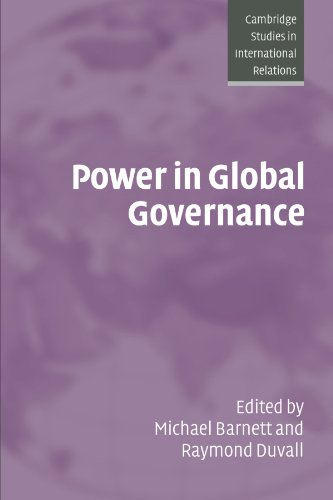

Most ebook files are in PDF format, so you can easily read them using various software such as Foxit Reader or directly on the Google Chrome browser.
Some ebook files are released by publishers in other formats such as .awz, .mobi, .epub, .fb2, etc. You may need to install specific software to read these formats on mobile/PC, such as Calibre.
Please read the tutorial at this link: https://ebookbell.com/faq
We offer FREE conversion to the popular formats you request; however, this may take some time. Therefore, right after payment, please email us, and we will try to provide the service as quickly as possible.
For some exceptional file formats or broken links (if any), please refrain from opening any disputes. Instead, email us first, and we will try to assist within a maximum of 6 hours.
EbookBell Team

0.0
0 reviews
ISBN 13: 9780521840248
Author: Michael Barnett, Raymond Duvall
This edited volume examines power in its different dimensions in global governance. Scholars tend to underestimate the importance of power in international relations because of a failure to see its multiple forms. To expand the conceptual aperture, this book presents and employs a taxonomy that alerts scholars to the different kinds of power that are present in world politics. A team of international scholars demonstrate how these different forms connect and intersect in global governance in a range of different issue areas. Bringing together a variety of theoretical perspectives, this volume invites scholars to reconsider their conceptualization of power in world politics and how such a move can enliven and enrich their understanding of global governance.
1 Power in global governance
Conceptualizing power
How power is expressed: interaction or constitution
The specificity of social relations of power: direct or diffuse
Compulsory power: direct control over another
Institutional power: actors' control over socially distant others
Structural power: direct and mutual constitution of the capacities of actors
Productive power: production of subjects through diffuse social relations
From power to resistance
Organization of the volume
2 Power, institutions, and the production of inequality
Power, liberalism, and institutions
Liberal institutionalism
Liberal constructivism
Liberalism, hegemony, and international institutions
Bringing power back in
Which system?
Power relations and the reception of power
Normative implications
3 Policing and global governance
Policing and global governance through the prism of neoliberalism
Global policing and the different forms of power
Global governance on the ground: policing in practice
Policing privatization
Policing governance
Conclusion
4 Power, fairness, and the global economy
Defining fairness
Fairness, uncertainty, and institutional design
Power, fairness, and the international trade regime
Economic fairness and hegemonic power
5 Power politics and the institutionalization of international relations
Rationalist perspectives on supranational governance
The information argument
The incomplete contracting argument
The multiple-equilibria argument
Broadening the debate: the "power politics" of institutional design
The importance (to the enactors) of insulating the new equilibrium
Extending the logic
Power politics and institutional variation
Institutional engineering and the cooptation of the French Socialists: the system worked
A first cut
A closer look
A power-politics perspective
From anarchy to organization: the hidden face of power
6 Power, governance, and the WTO: a comparative institutional approach
Compulsory and institutional power in the WTO context: the shaping, application, and effects of WTO
Compulsory power: asymmetric material resources and the setting of WTO rules
Compulsory power: asymmetric deployment of ideational resources
Institutional power: deploying WTO rules through litigation and negotiation in its shadow
Institutional power: ideational resources in institutional context
Asymmetric avoidance of institutional constraints: use of "legal" protection and extra-legal coercio
Nested governance: the impact of WTO decisions on participation in other institutions
7 The power of liberal international organizations
Liberal international organizations
The authority of IOs
IOs, authority, and power
Compulsory power: authority as a normative resource to direct behavior
Institutional power: guiding behavior at a distance
Productive power: constitution
Conclusion
8 The power of interpretive communities
The role of interpretive communities
The concept of an interpretive community
Legal discourse as an intersubjective enterprise
The Security Council as a forum for justificatory discourse
The Security Council as a deliberative setting
The Kosovo case
Conclusion
9 Class powers and the politics of global governance
Stiglitz and globalization's discontents
Structural power
Power and class relations
Class power as global power
Powers and resistances
Articulating a hegemonic project: "entrepreneurship in the public interest"
Conclusion
10 Global civil society and global governmentality: or, the search for politics and the state amidst
Governmentality and the public–private divide
The power of markets
The power of politics
The power of power
11 Securing the civilian: sex and gender in the laws of war
Gender and the laws of war
Grotius and the laws of war
1949 Geneva Convention
Power and the production of difference
12 Colonial and postcolonial global governance
Ordering the global
Colonial governance
The subjects and objects of colonial governance
Contesting colonial governance
Postcolonial ambivalence
Resistance
Tags: Michael Barnett, Raymond Duvall, Power, Governance